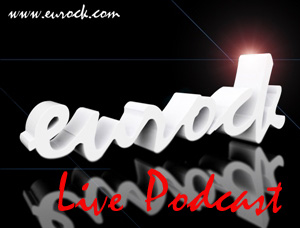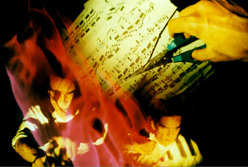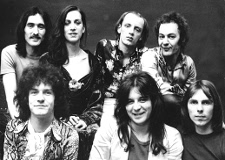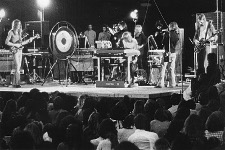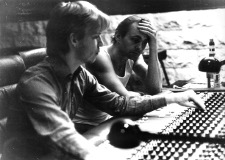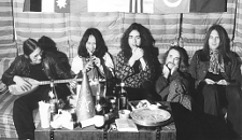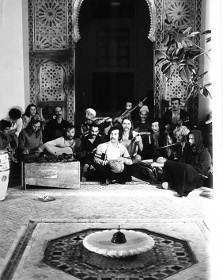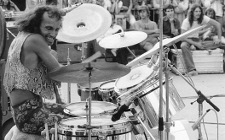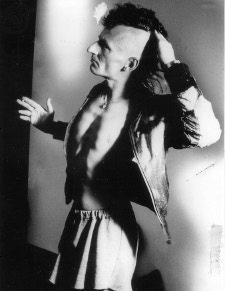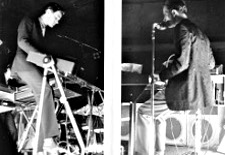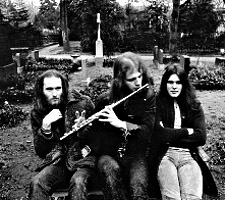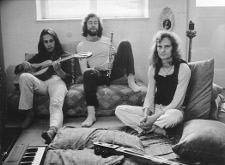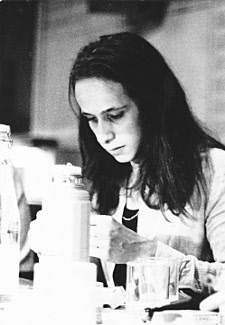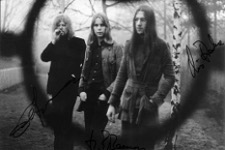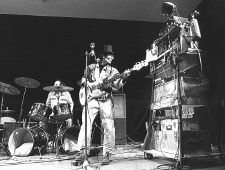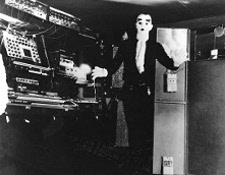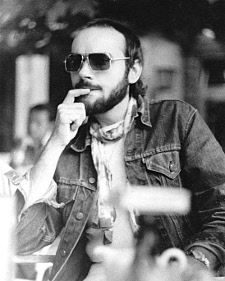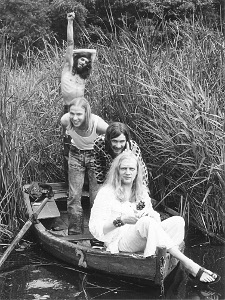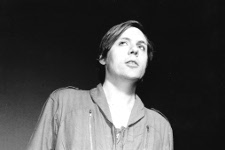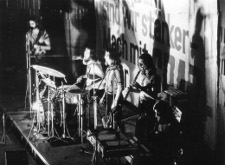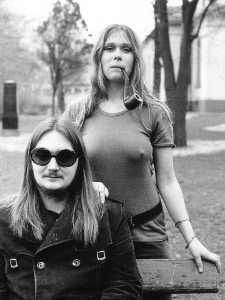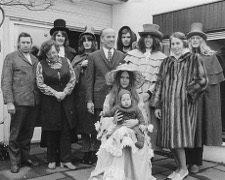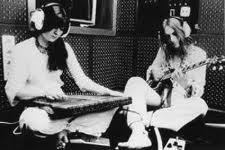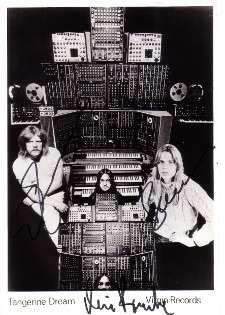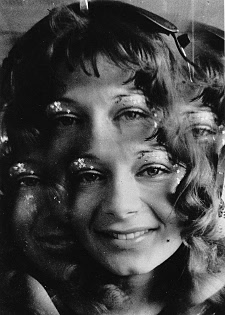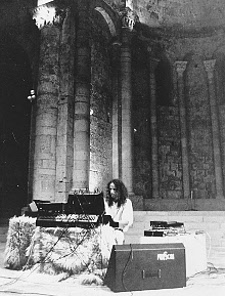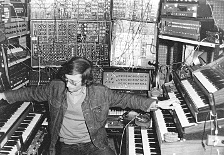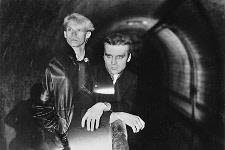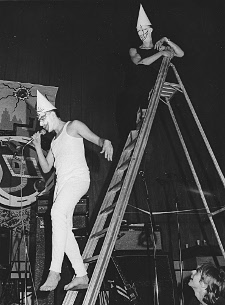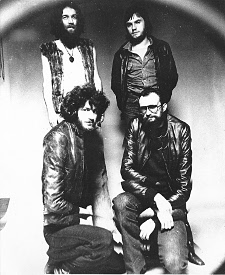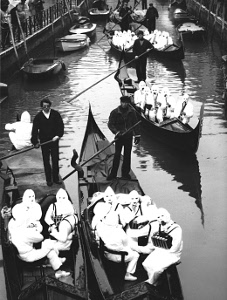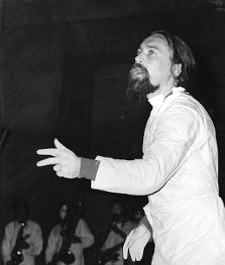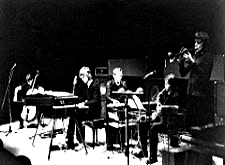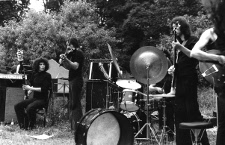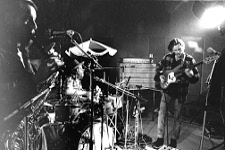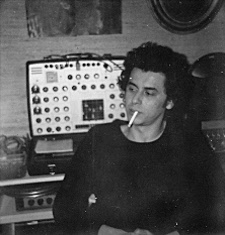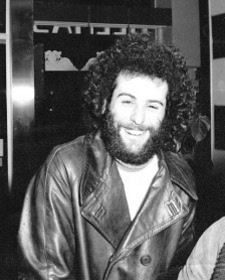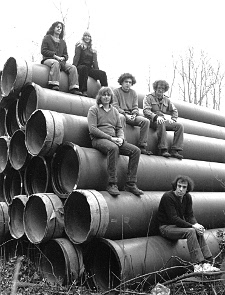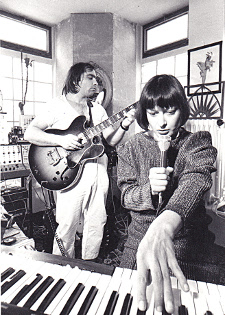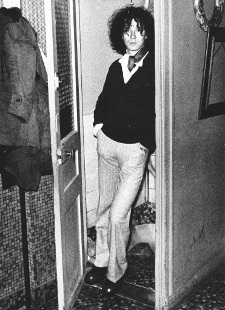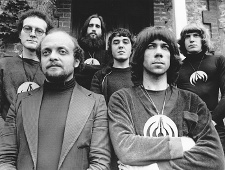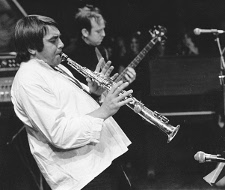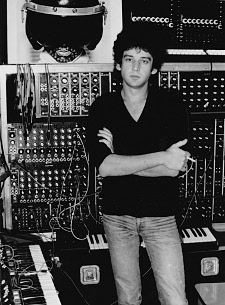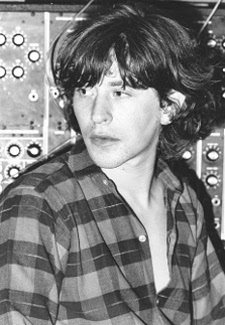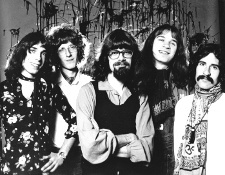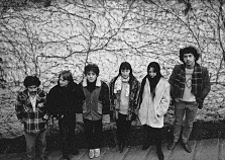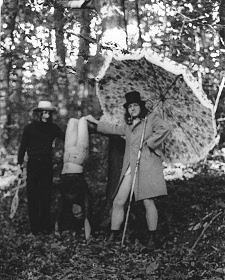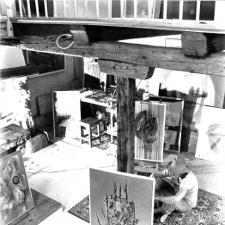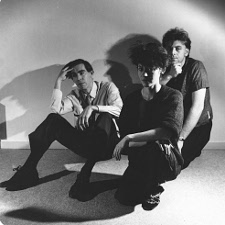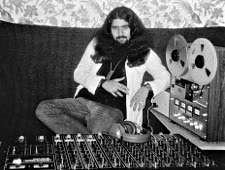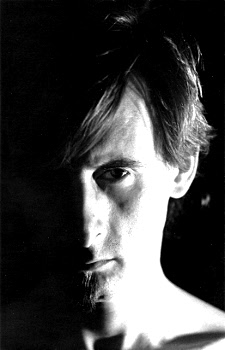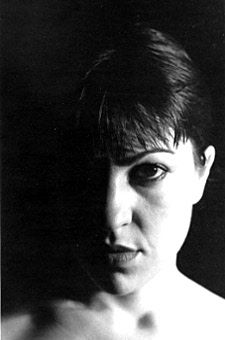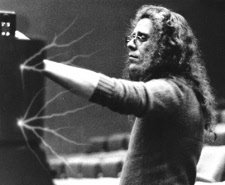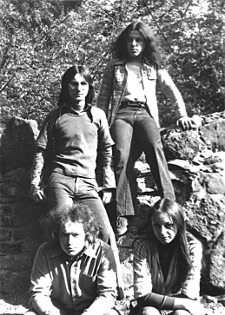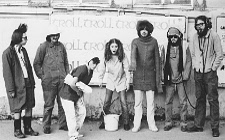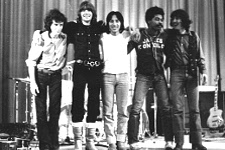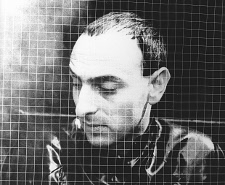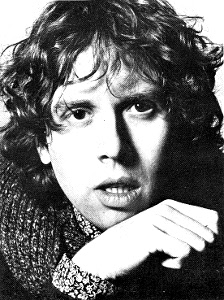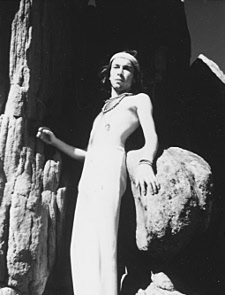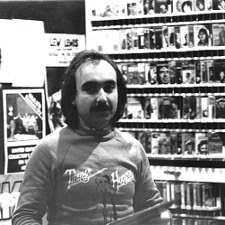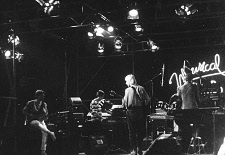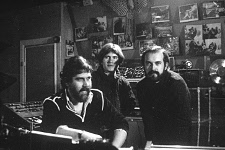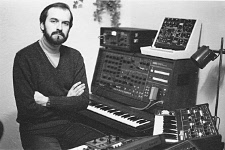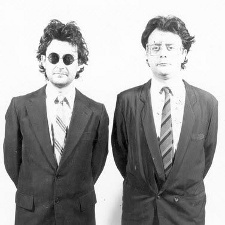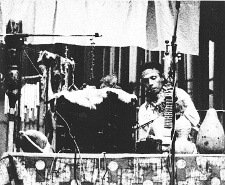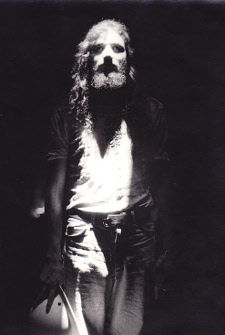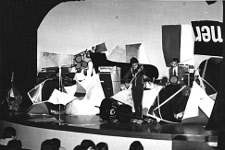The Story so far...
1970's- FM radio, Alternative Magazine & 1st US Indie Distributor of Euro Rock
1980's- D.I.Y. LP + Cassette & CD label
1990's- Distribution via the WWW
2010- Eurock.com ~ Multimedia Podcasting, Interviews & Reviews.
Label & Artist Submissions Accepted for Review...
Klassik Krautrock
Artistes Français
|
|
Archie Patterson Interview ~ THE Golden Age CD-ROM
Record collectors, start your hard drives: an unusually essential and downright user-friendly, CD-ROM has just hit the market that’s ready to scratch your data-greedy itch. Eurock: The Golden Age is an outgrowth of music journalist Archie Patterson’s long-running Eurock zine, that much-respected journal of European progressive and psychedelic music. (Patterson also operates a similarly inclined Web mail order operation under the same name.) The ROM reproduces every issue going all the way back to its ’73 debut, no mean feat at that, and loads in a wealth of extra goodies as well. By way of personal testimony, I came across Eurock a few years ago while trolling a studious Internet mailing list devoted to Krautrock – one of my personal obsessions dating back to my tender years – and took note of the address as a likely source for records and CDs. (I was right.) Patterson also was one of the more astute posters to the list, which I duly noted as well. According to Patterson, speaking of the impulse behind the ROM, “I felt books were old-fashioned and suggested we take it into the 21st century. I also had a lot of video material [among the video clips are performances by Krautrock heroes Amon Duul II and Popol Vuh] and liked the idea of incorporating that as well, thus making it a true multimedia representation.” Additionally, the ROM contains a massive discography, complete with cross-referencing links and a search feature, making the disc a key reference work. Easy to navigate, it sports crisp, uncluttered graphics; a free version of QuickTime is included for playback of the videos. And as a bonus its includes a separate music section featuring 40 minutes of ethereal, stimulating Prog by Japanese composer Hiro Kawahara. Worth noting too: if the project, which consumed over 3 years and numerous beta versions before the final incarnation, is successful, an updated DVD edition is likely. Putting things into perspective, however, Patterson suggests there’s a motivation simpler than wanting to go hi-tech: to keep spreading the word. As he puts it, “Music is the essence of life. It enriches beyond imagination. You can see, feel, touch, smell and fall in love to music.” What follows is the transcript of my interview with Patterson, which I initially conducted for Magnet Magazine for our music news item section. (Feel free to check Magnet out via our website at www.magnetmagazine.com .) He was so forthcoming with his answers, and included so much excellent info about the ROM and Eurock in general, that I felt I would be remiss if the entire thing were not made available to the general public. -Fred Mills
FM: When/why did you decide to launch the project? Demand for the back issues as a prompt, or had you considered doing it all as a website at one stage, etc? Archie Patterson: The project was initially brainstormed early in 1998, the 25th year of Eurock's existence (it was started in 1973). I had amassed a virtual history of groups - features, interviews and reviews - from this particular music genre. A long time friend Robert Carlberg suggested I digitize it all and do a book. I said, "Yikes, that'd kill me!" (laugh) He then said, "OK, I'll do it." We talked about it a bit. I felt books were a bit old-fashioned, and suggested we take Eurock into the 21st century and do something for the computer, like a CD-ROM, that would have many more possibilities and be completely unique (at least for this type of journalism). FM: How long did it take to get everything scanned in and/or reformatted? (How many pages total?) Were there any pitfalls along the way? AP: It took Bob perhaps 4-6 months to scan everything in. He sent me diskettes, and I loaded them onto my computer and arranged the various parts into a coherent whole along the way. I actually never did a page count, but all the back issues combined make up a pile that is over a foot high. His incredibly hard work literally made it a reality. The next big question was how to find a programmer who would do the actual ROM work. A friend of a friend put a notice on a local Net tech news group for me and I got several enquires. Out of them, one person named David Gillaspey was very interested, and a nice guy as well. We had a couple meetings, he suggested a modest fee, and took the project on. My oldest son Aaron (who is now in college and interns for Microsoft in the summers) had done some initial prep work for me on the project and sketched out a mock interface upon which David and myself built the "look" of the project. David did an extraordinary amount of work without complaint. Without him there would have been no finished product perhaps. From conception to finish, it took some 3+ years. FM: Which of the added features posed the greatest, if any, obstacles? Was the discography easy enough to compile from your existing materials or was there additional research involved? How'd you go about getting the rights to include the videos? AP: The Discography was compiled from the original issues, with help from a few other people, as well as a few reference works listed in the credits section. Bob did much of that work, with me revising and checking things. Perhaps the Index was the trickiest as it contained so many links cross-referencing the simple listings to multiple info. sources. That was the last feature we decided to add in. Fortunately it turned out less daunting than originally imagined programming-wise, or we (David particularly), might have died at that point. As we went along, many times we debated what to add in or delete from the final product. There were many obstacles, mainly trying to get all the components to work together as introducing a new feature often caused one of the others to need a change in terms of simple functionality. There were some 70-beta versions with various people on both MAC and PC testing several of them. I've had a lot of video material sent to me over the years, and of course liked the idea of incorporating that and music as well into the project, thus making it a true multi-media representation of the genre. The addition of video gave the project a unique aspect; that has never been done before. I have always tried to take Eurock into virgin territory. So I contacted the people who had originally sent me the video, and music, and asked them if I could include it. They were long-time friends and liked the idea. They said, sure you can use it, you've always helped promote the music, so let's go ahead and try this new way of journalism. The project really was not looked upon as a commercial venture, but more as a cultural history of the music, the times, and my life's work. Over the years I was very lucky to meet some great people who helped me. Those people made my life very interesting and creative personally, and I helped them a little bit with their music. It was synchronicity. This whole project really - art work, design, music, video and everything - was done "with a little help from my friends" who worked like a sort of extended family to create something that I could have never been imagined at the outset. It was a very open process with everyone basically giving of themselves in an unselfish way to make it happen. I feel honored and blessed that they gave me their time and energy. FM: What was your original intent or motivation with Eurock, how has that extended into the present with your mail order operation, and do you foresee expanding things (such as updating stuff that's on the CD-ROM over time or going to DVD) or moving in other directions in the future? AP: My original idea was simply to share the new, amazing music I had discovered with some new "friends." Inspired by Greg Shaw's great rock and roll fanzine, Who Put the BOMP, a friend, Scott Fischer and I, started writing and all else simply came to pass. One friend had access to a Xerox (at the office of the law firm where he was a gopher). Later another worked with an offset printing press (at the local public schools building). All the work was done "underground” at night (laugh). It was a wild and wonderful set of happenstance occurrences that could almost only have come about during those times. As a result of the first couple issues of Eurock I was asked to run two of the original, pioneering, import music companies of the golden era of imports during the 1970's (Intergalactic Trading Company & Paradox Music, a part of Greenworld Imports). At the outset of the 1980's I decided to do Eurock on my own and from there on things just kept growing. In a sense, the title The Golden Age (suggested by my 12 year old son Sky) was intended to reflect the particular spirit and nature of the music that was being produced during that time. As for the future, there are now more interviews being done with new musicians, old music friends and fave groups from the past that keeps the spirit alive with musically today. They are incorporated into www.eurock.com periodically. The next big project will be a book compiling the main articles from the CD-ROM and new ones that are now being done. Tentatively titled EUROCK - European Rock & the Second Culture, it will reflect a bit different socio-political perspective than the CD-ROM, but nonetheless continue the concept that always underscored my work with Eurock. After the CD-ROM came out I got many people asking for a book to curl up with and read in bed (hmmm, what can I say about that one, I might have a few other thoughts myself... laugh). There could be DVD projects as well as that has been talked about and would be another step forward for Eurock. FM: Prog-rock, Krautrock, Eurock - are labels useful? AP: Labels can be good, but also meaningless. The Germans hate the name "Krautrock," considering it a derogatory word invented by English journalists. I read the very first articles on German space rock in the UK press however, and for the most part the writers were raving about how great the music was. So I think it’s a sort of culture clash situation. As for Eurock, of course that's a great name as I made it up (big laugh). I do think labels can define a sound and style, but are often used to lump a lot of junk into a marketing category. Perhaps that's my (and others) big objection to the term Krautrock. Like everything else in life, both good and bad can flow from the same thing. What matters is whether you walk in a straight line and never speak with a forked tongue (laughing again). FM: Record collectors: hopeless geeks, or passionate/enlightened freaks? AP: Music is the essence of life and I think people who feel passionately about it understand that, which is great. Again, however, that can cut both ways (can't everything)? It can also inspire less than rational attitudes, and sometimes make people lose sight of the real value of music to their lives. I personally have been labeled as many things, and only occasionally do they seem to fit in my estimation. I do know that for myself music became a central part of my life very early on (10 years old in fact) and to this day enriches it beyond imagination. You can see, feel, touch, smell and fall in love to music. The great poets and musicians of the ages echo that, and from my own personal experience I can say it is definitely true.
|
 reviews features podcasts email bio
reviews features podcasts email bio